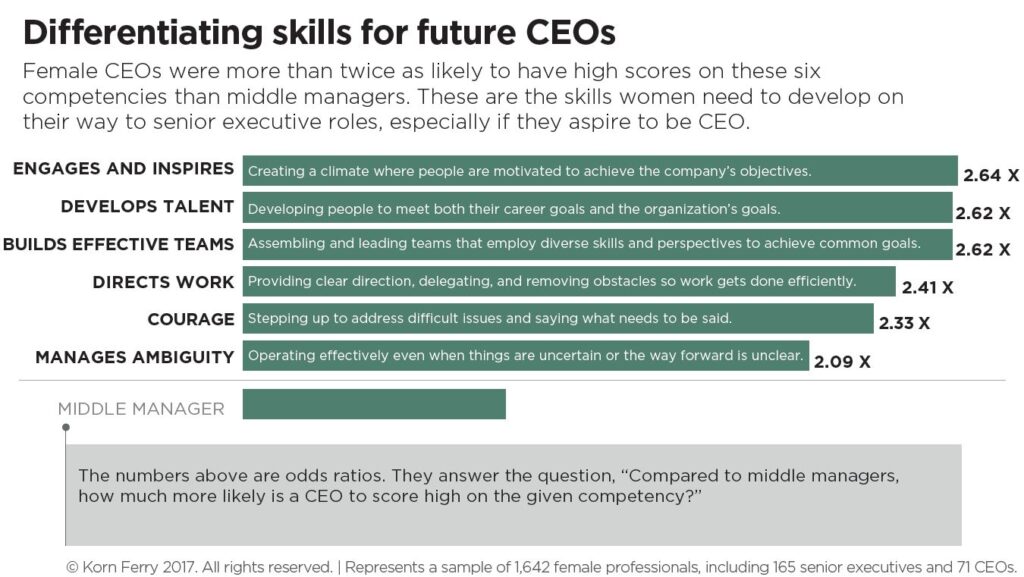A study aptly named the CEO Pipeline Project conducted by Korn Ferry, a global organizational consulting firm, and the Rockefeller Foundation looked at women who have already succeeded at becoming CEO to find out what makes women CEOs different. The goal of the study was to provide findings and recommendations for companies and women so that there will be more women CEOs in Fortune 500 companies by 2025. Their findings also further support having diversity in leadership is good for a firm’s bottom line.

Funded by the Rockefeller Foundation and conducted by Korn Ferry, the CEO Pipeline Project has a goal to have 100 women CEOs in Fortune 500 companies by 2025. The study included 57 well-known current and prior women CEOs, from 41 Fortune 1000 companies and 16 large privately held companies. The study focused on what success factors enabled these women to become CEO of a major company. Only 2 of the 57 participants were of Asian ancestry – Constance H. Lau of Hawaiian Electric Industries and Lisa Su of Advanced Micro Devices.
Korn Ferry also gathered publicly available biographical data about all female CEOs in the 2017 Fortune 1000 and compared that to a parallel sample of male CEOs who led companies of the same revenue size. The study’s findings further support that having diversity in leadership is good for a firm’s bottom line.
Key Insights
- There was no one path to becoming CEO.
- Women CEOs worked harder and longer to get to the top.
- They were driven by a sense of purpose and in achieving business results.
- There are defining traits that sustained a path to CEO.
- Women CEOs are more likely to engage the power of teams.
- A mentor or sponsor encouraged them to reaching for the CEO role.
- Their technical and financial backgrounds served as springboards.
Women CEOs were groomed internally and had more diverse experience
Women CEOs were four years older on average when they reached their very first CEO appointment and accrued more diverse experience by working in a greater average number of senior roles, functions, companies, and industries. Only 24% of the women were external hires for the CEO position. The rest were groomed internally by their company.
The women also worked for their company for an average of 12 years before being promoted to CEO. Those with line responsibility, defined as having profit-and-loss or direct client responsibility, are best situated to become new CEOs. Roles with line responsibility are most typically president, division president, or chief operating officer.
Women CEOs are optimistic, achievement-oriented, and empathetic
The women CEOs have a large appetite for challenge, such that they did not view organizational barriers —including getting fired, being handed leadership of failing divisions, being excluded from all-male networks, or being told to literally erase career goals from a performance review—as obstacles. Instead they saw them as learning opportunities or as situations that they could use to demonstrate their ability to deliver results. Though they have high levels of independence, they also showed benchmark levels of collaboration and high humility.
Women benefit to recognize that top appointments are generally based on a “personal trust and knowledge,” not just good results.
Women CEOs gained institutional support and sponsorship
At the senior executive level, important relationships shift away from mentors who offer encouragement and advice to sponsors who take a hands-on role in managing career moves and promoting executives in front of the board. These relationships are not always smooth and idyllic, and sometimes include tough interactions and difficult criticism. Women benefit more to be mentored on learning the strategic, financial, or nuts-and-bolts side of making the business run.
Beyond sponsorship, some of the women underestimated how much personal endorsement they would need to reach the threshold of the CEO’s office. Men not only sell themselves more aggressively, they champion one another constantly. Women benefit to recognize that top appointments are generally based on a “personal trust and knowledge,” not just good results.

Helpful Resources
Women CEO Speaks (full study)
Asian Women in Leadership with Dr. Yon Na, Phd
Bust the Bamboo Ceiling: one mistake smart Asian managers make and how to fix it
Get a monthly dose of our latest insights!


About
myasianvoice
At MyAsianVoice, we connect Asian Americans to surveys and research to bridge the Asian data gap.
Join our growing respondent list >>
